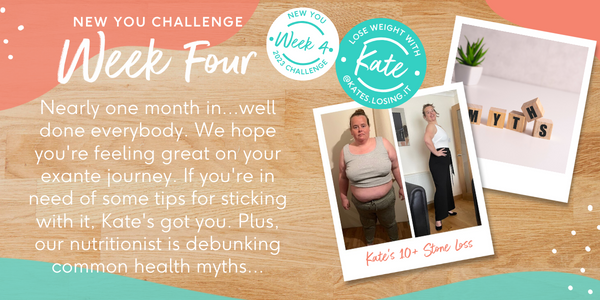Welcome to Week 4! Kate's Check-in...
Our Nutritionist Debunks common nutrition myths
Welcome to a new week of your challenge! This week, I’m going to take you through the most common nutrition myths & misconceptions and debunk them...let’s get started.
1. Snacking is bad for you
This is one of the most common myths I come across, LOTS of people think snacking can lead to weight gain but in fact it's the opposite. The key is to choose the right snacks that will support your health journey.
Snacking is a great way to curb cravings, manage blood sugar levels and support with reaching your nutrition targets.
Here are a few examples of snacks I love:
1 tbsp of peanut butter and carrot sticks
Sliced cucumber and hummus
exante BURST sachets
exante choco balls
What’s the science behind it?
Research has shown that snacking also:
Provides a boost of energy between meals, this is especially true if you like to leave sometime between your meals.
Helps manage appetite, to prevent overeating at each meal.
When choosing the right snacks, snacking can help provide extra nutrients that you may have missed out on your main meal (eg: healthy fats in peanut butter).
Not all sugar is created equal. And while you should aim to reduce the amount of processed (or added) sugar you consume; we still need healthy sugars for a quick source of energy and nutrients. (An example would be sugars in fruit)
While a moderate amount of sugar doesn’t seem to be harmful, having too much can put you at risk for gaining weight. But that's the same for anything, if overconsumed. It’s all about balance and moderation.
Certain medical conditions such as diabetes may require specific sugar levels each day, for which we’d recommend getting advice from your GP on how much you should be consuming.
Limiting your sugar intake can help you reach your weight loss goals, but it's important that you’re also mindful of your overall calorie intake.
3. food is healthier than frozen or tinned
One of the most common misconceptions people believe is that they should purchase all their food fresh, because it’s ‘healthier’ than frozen or canned foods.
This isn’t always the case... Let me explain:
Fresh produce has to be harvested, processed and then travel (sometimes overseas) to reach the supermarket shelves. Some research has found that small amounts of nutrients are lost during transit (due to the temperature and transport storage), however are still relatively fresh by the time you do your weekly shop.
The good news is, the nutrient content of canned and frozen fruit & veg is comparable to fresh and, in some cases, it may even be higher. That’s because canned and frozen produce is processed immediately after harvesting, so loss in nutrients from picking and transport is minimal.
If you are looking for healthy and cost-effective options, canned and frozen fruit and vegetables are an excellent choice, plus there’s much less food waste!
4. Carbs make us gain weight
What carbohydrates should I choose?
You may be surprised to learn that carbs aren’t just the typical pasta and bread. Fruit and veg even contains carbs, and are also a great way to get fibre intake too!
-
Opt for fibre-rich fruits and vegetables, such as whole, fresh, frozen and canned, without added sugars or preservatives. Products that are rich in fibre can help with bowel movements, digestion and can even keep you fuller for longer!
-
Choose whole grains instead of refined carbs. So for example, opt for brown bread and brown pasta instead of white. Why? Because whole grains provide fibre, vitamins, minerals and other nutrients. Whole-grain foods also help control cholesterol levels, weight and blood pressure. These foods also help lower the risk of diabetes, heart disease and other conditions.
-
Like with any food group, it’s important to consume in moderation. Refer to last week’s balanced meal guide to understand how much you should be eating, and remember to track your calories to remain in a calorie deficit!
I hope you’ve learned a few things from this myth-busting article... Which one were you most surprised by?





